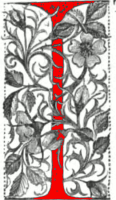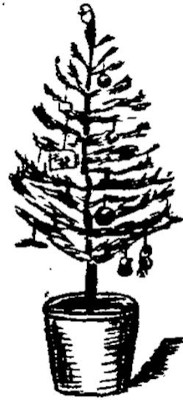This article has been transcribed from a copy of the Cardiff Times in the online collection of scanned Welsh newspapers 1804-1919 in the National Library of Wales, with grateful recognition of the free access accorded to all readers. Paragraph breaks have been introduced for easier reading.
It is not clear whether the consistent use of the abbreviation, 'Xmas', in the text, and the spelling out of the full name 'Christmas' in the title are in any way significant. The article seems to have been written in the expectation of publication before 25th December and shows Samuel at his most platitudinous. —— David Skilton

t is a common notion that articles about Xmas are written in the dog days, and that the purveyor of jokeless pantomimes grinds them out during that period of the year when ordinary and non-literary humanity is taking its annual mid-summer holiday. Now this is certainly not my case, for I am penning this article with the frost on the window-panes, the chilblains on my feet, the cold in my bones, and the sensation in my mind that if I could only get within measurable distance of a good fire and a glass of something warm (whether inebriating or not) I should take some moving.
Christmas, we are told. with an absurd accuracy, 'comes but once a year.' It would be a most extraordinary thing if it came more than once, seeing that chronologically it can only arrive about the 24th of December. Yet we are, in spite of these known facts, [we are] yearly informed that 'Xmas comes but once a year,' which has long seemed to me to be a decided waste of information on the part of those supplying it. There are certain things connected with Christmas to which I take a very strong objection. I consider them conducive to fraud and dishonesty. Take, for instance, that old humbug. Santa Claus.

Father Xmas.
All the children in the town are taught to reverence him as though he were an angel, whereas he has no existence at all, and is only the outcome of someone's fertile imagination. Yet the children are taught the most awful lies about him. and his absence is frequently held out as a Christmas sword of Damocles to frighten or coerce such boys and girls as misbehave themselves near the approach of the festive season. And the children are foolish enough to believe all that is told them of this wonderful old man who is supposed to bring these toys down the chimney – or by other equally unusual means of entry.
Why, if they thought about it for half a minute, they would know that if he came down the chimney with a bag full of toys he would be certain to get them all spoiled with the soot. And all children know that Santa Claus never brings anything but new toys, with him. It may be very pleasant for the little ones to fancy their presents come in some mysterious manner, but it must be a rude shock to their nerves when some spiteful upgrown sister or brother knocks the bottom out of their ideas by telling them the truth and explaining the mystery of the stockings and the toys.

The wait.
Ah well, we all have had our pleasant delusions ere this, not only at Christmas but at other times, and God grant all the little ones may find Santa Claus, in whatever form he comes, has brought them lots of toys and lots of crackers and fun.
Christmastide gets sadder as each year rolls by, and the older we get the more we are tempted to gather those we love round the fire, when- the Christmas logs are piled up, and where the fire of love and charity enters as a doughty rival for the Christmas honours, with the more material fire which warms the outer being.

The Xmas tree.
There is, after all, always something sentimental about the family party at Christmas. The meeting of those parted through the year — of mother and son, of sweetheart and lover -- and if there be a chair less at the table than when the Xmas party met a year ago there is the consolation left that the dear departed one may be spending a happier Xmas even than those who are left behind.
There are those who object to Xmas on account of its bills, and many are the lines written and sung to show that is a terrible time for those who are burdened with the cares of housekeeping.

Not only do many of these people grumble at the festive season, but the crusty old bachelors of the Scrooge type say the most awful things about Xmas and its consequences. They sneer at the turkey and plum pudding, and foretell the most terrible disaster as likely to result from the consumption of the popular mince pie. They abhor the waits and look upon Xmas boxes as nuisances to be avoided if possible. Their idea Xmas if much as follows:
This is the season when ailments dyspeptic
Are felt in the frame of the young and the old;
The time when each horrid and sneering old sceptic
Is hoping sincerely the waits will catch cold.
I do believe these cross-grained old fossils would be supremely happy if they could deprive people of their Christmas festivity and happiness. But thank goodness that cannot be so long as the mistletoe and holly are around, and young men and maidens are allowed to meet each other as they have always done since the days of our great grandmothers. The pictures of old-time Christmases showed that they enjoyed themselves to the full in the past Why, then, should we not follow their example in the present? Do so, say I, and may you one and all have a royal time of it.
Links to Related Material
Last modified 17 April 2022